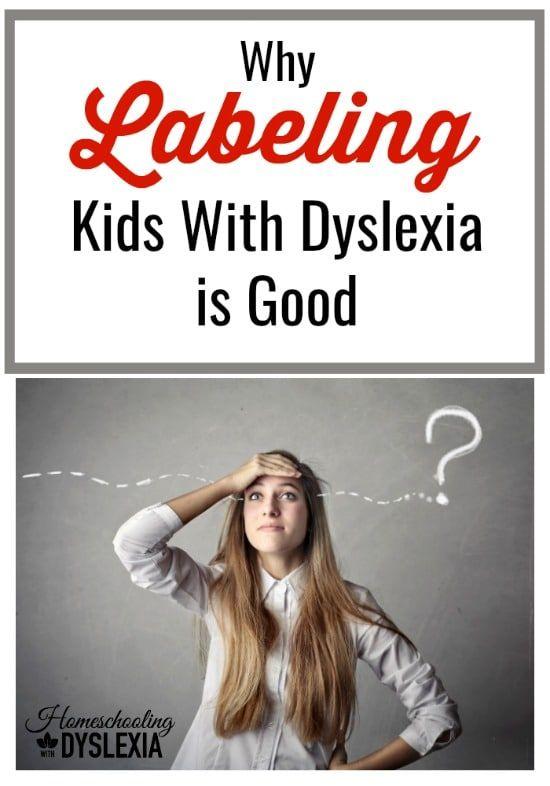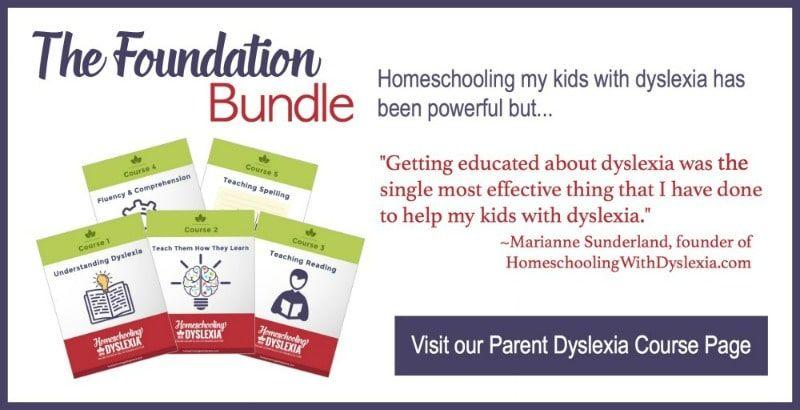Whether or not to ‘label’ a child diagnosed with dyslexia is a common concern among parents. As the parent of 7 kids with dyslexia and a passionate dyslexia advocate, I strongly believe that labeling kids with dyslexia is a good thing.

Why Saying Dyslexia is SO Important
First, there should be no SHAME in a dyslexia diagnosis – for anyone! When moms pull me aside at park day and practically whisper to me that they suspect dyslexia in their child, they are under the misguided belief in one of the many myths surrounding dyslexia.
For years I thought that my kids’ dyslexia was caused by poor nutrition or lax parenting or that maybe my kids were just not very smart. It was a terrible time as child after child of ours was diagnosed with dyslexia.
Dyslexia is not an intelligence issue.
Dyslexia is not caused by poor parenting.
Dyslexia is genetic – a difference in brain wiring – not a disease.
Dyslexia is a learning difference! When parents (and their dyslexic kids) get educated about dyslexia they can begin to be a source of accurate information for other families not so far along on their dyslexia journeys.
Learn more about the unique strengths of dyslexia here.
Why a Dyslexia Label is So Scary
Many parents fear saying dyslexia to their kids and others for a few reasons. They fear that their kids will be misjudged by teachers, family, and friends or that their kids will use it for an excuse not to work hard.
Acknowledging your child’s dyslexia is incredibly important for several reasons:
1. Kids with dyslexia eventually realize that they are different than many of their peers. Whether they read slower (or not at all for a time) or have trouble memorizing math facts, can’t spell or can’t pay attention and sit still – your kids are eventually going to recognize that they are different. By acknowledging their dyslexia you are helping them to understand why they are the way they are.
2. For many people with dyslexia, especially those that have gone undiagnosed until adulthood, knowing that there is a reason for their learning struggles, and that there is a solution for them, is incredibly freeing. These people have spent years of their lives believing that they are stupid which takes a huge toll on confidence.
Statistics show that 85% of prison inmates are illiterate and that a significant number of these are dyslexic. Statistics also show that 40% of entrepreneurs are dyslexic. Since dyslexia affects about 20% of the population, this is a significant statistic. Studies also show that the single most impacting factor in a successful adult dyslexic’s life is having a caring adult that stood up and advocated for them. How parents handle a diagnosis of dyslexia is of vital importance.
Telling our kids about their dyslexia can actually helps kids be more motivated. If we don’t help our dyslexic kids to understand themselves and, in doing so, help others to understand dyslexia, dyslexics are going to continue to be misunderstood.
Read more about how to talk to your child about their dyslexia here.
Is Dyslexia a Learning Difference or a Disability?
Dyslexia is considered a learning disability by educators. As the homeschooling mom of 7 kids with dyslexia, I’ll be the first to acknowledge that dyslexia looks like a disability when you are teaching language arts to a young dyslexic child. However, with the right methods, all kids with dyslexia can learn to read. They just learn differently, therefore they need to be taught differently.
Educators need to get educated on dyslexia. Parents need to get educated on dyslexia. We need to do this so that we can help our dyslexic kids be understood and educated in the way that they learn. Being open about our kids dyslexia and stepping up to advocate, no matter how difficult at times, is our responsibility as the parent of kids with dyslexia.
Labeling a child with dyslexia has a bad rap. What you are doing when you bravely say dyslexia is acknowledging that dyslexia exists and that it is nothing to be afraid of. You begin to bring knowledge and understanding which not only helps your kids but all dyslexic kids.
How about you? Have you acknowledged your child’s dyslexia? Why or why not?
The Importance of Parent/Teacher Education
This site exists to educate and encourage families with dyslexia. Dyslexia does not need to be a disability if the the teacher understands how dyslexics learn and the right teaching methods are used. For more in depth understanding about teaching kids with dyslexia, consider taking one of my parent dyslexia courses.
Stay in Touch
We have quite an active Facebook community where I frequently post articles of interest and encouragement. I also have a growing Pinterest Page with a wide variety of teaching tips for all subjects.
You can also subscribe to receive blog updates via email below.
Join the newsletter
Subscribe to get our latest content by email.







Yes, we acknowledge that all three of our young boys have dyslexia. We tell other people, the boys themselves know, and we try to share what we know with others who are obviously struggling.
Yes. My son knows that he and I both have dyslexia and dysgraphia. We don’t hide it but we don’t use it as a crutch either. It is simply the way we learn. 🙂
I feel the need to educate others on dyslexia. I share with everyone why we homeschool (to learn in a way that reaches my two daughters with dyslexia). We acknowledge the gifts as well as the challenges when discussing dyslexia with our girls and other people. Once my oldest (11yo) understood what her challenges were, she found her gifts. She is an entrepreneur and started her bag design business this year. I can see judgment in other people’s eyes when telling them about my daughters’ dyslexia, but we are just one link in the chain in understanding these amazing people who think differently! Thanks for the article!!!
Absolutely we are up front with this. I really wish I had better documentation for our oldest son, since a “paper trail” is needed by the ACT/SAT to get testing accommodations.
Marianne, I emailed you about the courses you offer.
Our son knows he has Dsylexia and that his Dad and Paternal Grandmother has it. They bith graduated and my husband had a great job working for the Space Shuttle Program. He tells our son, you keep trying and make your own accommodations to adapt. Our son is SO smart on our farm and out of four boys we trust him the most to run our farm equipment.
I am Dyslexic myself, I have also been recently diagnosed with mild Asperger syndtrom. I also have two children who are also dyslexic. To get the professorial’s (i,e psychologies ) and the education authorities to recognise our learning obstacles as-well as our processing is different, there is another way of teaching. Learning is a battle, the obstacles that are faced are made a hundred time worse. The ignorants of these people who apparently know what they are talking about, fills me with complete confusion. In my opinion we are not the ones with the learning difficulties we have a big understanding of the daily fight, just to be organised on daily basis is exhausting. On a daily basis my head feels like it’s going to explode, my children are very much the same. My son is also on the autistic spectrum but is jet to be diagnose, fighting the system as-well as educating your child of their obstacles does take it’s toll. As a parent it my responsibility to educate my children in self believe, self disciplined and to understand their own abilities as-well as their obstacles. I believe that we need to stand to together and educate people and show them what it’s like to live in a battle field in our heads everyday. We have the ability, capacity more so the patients to show others that we can overcome the obstacles and we are valued members of society.
I remember feeling the pressure from some people and teachers…even in the Homeschooling community, as they often times come from the brick and mortar schools, to avoid being labelled the dreaded word–Dyslexia! To me, Dyslexia is my incredible blessing, I love how I think different from others and offer fresh ideas to things. I actually wrote a post about that here http://thedyslexichomeschooler.blogspot.ca/2013/12/hi-guys.html and I was amazed at some people’s reactions. It has been such a relief to our family knowing that this may be a bumpy road but, now we know what tools to become better at how God made us to be 😀 Happy Learning!
Why should you not be hasty in labeling a slow reader or a child who is having reading difficulties as dyslexic?
Generally, I have found that those parents who don’t want to label a child aren’t really doing it out of love for that child. At the honest, real core, it is to protect themselves from being judged as a parent. The parenting wars need to stop!! It is harming kids and causing emotionally damaged mothers. Some churches are not helping with their false “name it, claim it” philosophy. As if not naming dyslexia means the child is not suffering emotionally from not getting the teaching method needed. The opposite proves true. Naming it FREES the child from self hatred and naming it gives everyone a plan to work with towards success.
What are the best ways to get a diagnosis? I have 2 children that are dyslexic but have not been officially diagnosed. My older son is 16- we have always homeschooled and he has been very successful. But testing is coming up
and he needs the accommodations. Not sure where to turn next.
Here is a comprehensive post I wrote about that!
https://dev.homeschoolingwithdyslexia.com/homeschooling-with-dyslexia-get-testing/